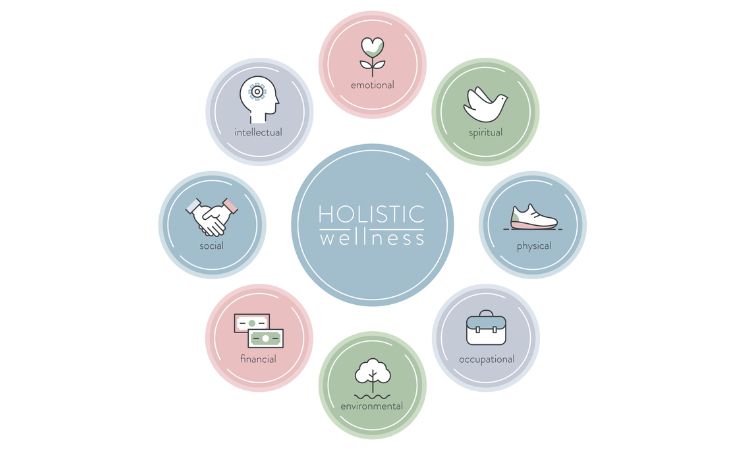In the pursuit of optimum health and well-being, embracing the concept of holistic wellness has become increasingly popular. Holistic wellness is an approach that considers the individual as a whole, taking into account physical, mental, emotional, and spiritual health. A crucial element of holistic wellness is healing therapy, which seeks to integrate different methods of care to promote healing and a state of balance within the body.
The Essence of Holistic Health
Holistic health revolves around the philosophy that individuals have intrinsic healing powers. This approach to wellness emphasizes the connection among the body, mind, and spirit. Holistic health practitioners believe that by harmonising these elements, individuals can achieve greater health and vitality.
One of the central tenets of a holistic approach is the understanding that each aspect of a person’s life contributes to their overall health. As such, a holistic health strategy might include a range of treatments from dietary adjustments and physical activities to meditation and counselling.
Understanding Healing Therapy
Healing therapy is a broad term that encompasses a variety of treatment techniques designed to initiate the body’s own healing processes. Therapies can include energy healing, bodywork, nutritional counselling, psychotherapy, and more. The primary goal of healing therapy is to restore harmony and balance, which is often disrupted by stress, illness, or environmental factors.
The Benefits of Healing Therapy
Individuals who engage in healing therapy may experience a multitude of benefits. These benefits not only affect their physical health but also enhance emotional stability and mental clarity. Healing therapy has been known to reduce stress, alleviate pain, improve sleep patterns, and boost immune function. This integrative approach supports the body’s natural ability to heal itself.
Addressing the Physical Dimension
Physically, healing therapy can have a profound impact. Techniques such as massage therapy, acupuncture, or reflexology can help to alleviate pain, improve circulation, and release muscle tension. Nutrition is also an integral component, with tailored diets and supplements often prescribed to support healing.
Nurturing the Mental and Emotional Aspects
Mental and emotional well-being is crucial in a holistic wellness plan. Healing therapy may incorporate aspects of psychotherapy, meditation, or relaxation techniques to help individuals cope with anxiety, depression, and other mental health challenges. By fostering a sense of peace and emotional resilience, individuals can face life’s stressors more effectively.
Spirituality in Healing Therapy
The spiritual element of holistic wellness is sometimes the most overlooked aspect, yet it forms a significant pillar in holistic healing. Practices such as yoga, tai chi, or spiritual counselling can play a pivotal role in connecting individuals to a sense of purpose and self-awareness, enhancing the overall healing process.
Choosing the Right Healing Therapy
When exploring healing therapy options, it is important to consider personal needs and preferences. Each individual’s path to wellness is unique, and what works for one person may not work for another. It’s essential to consult with qualified practitioners who can guide the selection of therapies that will best support individual health goals.
Customising Healing Therapy
Customising healing therapy to fit individual requirements entails a comprehensive assessment of one’s health condition and wellness objectives. A multidisciplinary team of healthcare providers may collaborate to create a personalised plan that addresses various aspects of well-being.
The Role of Professional Guidance
Professional guidance is indispensable when navigating the realm of holistic wellness. Established practitioners can offer insights and suggest the most effective therapies. Their expertise can help to avoid common pitfalls and harness the true potential of holistic healing.
Integrating Healing Therapy into Daily Life
Adopting healing therapy into one’s daily routine can help to maintain harmony and prevent the reoccurrence of imbalances. Practices such as mindful breathing, regular exercise, and balanced nutrition can be easily incorporated into everyday life, providing a foundation for lasting health.
Making Holistic Wellness Sustainable
The sustainability of holistic wellness lies in the adoption of healthy habits and a proactive approach to health. Education about the principles of wellness and the body’s needs empowers individuals to make informed decisions about their health care.
Committing to Long-Term Health
Commitment is key to the success of any holistic health plan. Engaging consistently with healing therapies and lifestyle modifications ensures continuous progress and enhancement of well-being. This long-term vision is at the heart of an effective holistic wellness strategy.
Concluding Thoughts on Holistic Wellness
Holistic wellness represents a shift in how we think about health and healing. Preferring a comprehensive approach over singular treatments allows for addressing the complexities of the human condition. Healing therapy is a powerful component of this paradigm, offering an integrative path to improved well-being. By embracing these principles and committing to personalised care plans, individuals can experience the harmonious state of health that holistic wellness provides.














